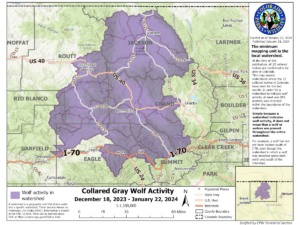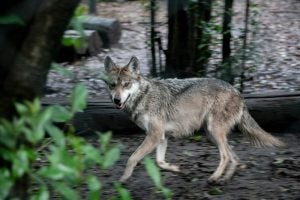Since Dec. 19, 2023, Colorado Parks and Wildlife staff have released 10 wolves, fulfilling the first step in the state’s reintroduction plan mandated by a 2020 ballot measure.
According to state officials, the reintroduction period is over — at least until this coming December.
“After an incredibly successful first release of wolves from Oregon last month, our focus will be on refining our internal processes, continuing the work we’re already doing to bolster our staff expertise, and honing our notification structure so the public is well informed regarding release efforts, while also balancing the need for the safety and security of staff and gray wolves,” CPW director Jeff Davis said in a press release.
A map published Thursday on Colorado Parks and Wildlife’s website informs the public, recreationists, and livestock producers about where wolves have been in the past month. This map will be updated with new information every month, produced on the fourth Wednesday of every month, and will reflect data for the prior month, give or take several days.
These maps are created using GPS collar data collected from all 12 collared wolves in Colorado, including the ten animals reintroduced from Oregon and the two collared wolves in North Park.

Colorado lawmakers have intervened, pushing for ‘chronic depredation’ definition
Don Gittleson, a rancher in North Park, has become the center of wolf reintroduction controversy. According to the Colorado Sun, 20 of Gittleson and his neighbor’s animals of various species of livestock and working dogs have been killed or injured by wolves since 2021.
One of the key issues, they say, is that a specific definition of “chronic depredation” is needed to allow for the killing of wolves that prey on livestock.
Democratic Representatives Julie McCluskie and Senator Dylan Roberts have written a letter to Colorado’s Governor Jared Polis and CPW Director Jeff Davis pushing for a specific definition.
“These killed and injured animals are not only the property of our constituents but they are key to their livelihood as agriculture producers,” McCluskie and Roberts wrote in their letter. Further, “Colorado’s agriculture industry is a crucial part of our state’s economy.”
The Wolf Depredation Compensation Fund, established through bipartisan support with the introduction of Senate Bill 255 last year, will compensate ranchers for veterinary expenses incurred in treating injured animals, including herding dogs. The fund allocates $525,000 over the next two years to cover livestock losses, offering up to $15,000 for animal deaths.

Four of the wolves released came from depredating packs
The initial 10 wolves were secured through an agreement last year with Oregon after Wyoming, Idaho, and Montana declined to offer wolves. Those wolves were airlifted to Colorado and released in Grand and Summit Counties between Dec. 18 and 22.
The release of two wolves into Grand County resulted in controversy when producers discovered that the wolves had come from the Five Points Pack in Oregon, a pack that Oregon Department of Fish and Wildlife Livestock Depredation Investigations say has killed and injured four animals in separate incidents between 2022 and 2023.
Two other wolves released that same day come from the Noregaard Pack, which was involved in the killing of a calf on June 15.
“Once a pack starts to depredate on livestock, they tend to include livestock in their diet in the future,” John Williams, Eastern Oregon Wolf Committee Chair told The Fence Post. “It does not say they always eat livestock, but it’s more like they acquire a taste for it, they like it, and they stay on it, and they may not.”


